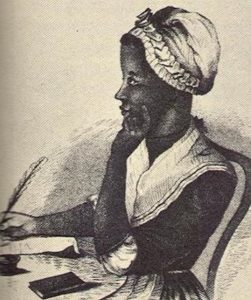
Phyllis Wheatley
*Phyllis Wheatley was born on this date in 1753. She was a Black slave poet and writer.
Born in Senegambia, Africa, she was sold into slavery at age seven and transported to North America. The Wheatley family of Boston taught her to read and write and encouraged her poetry when they saw her talent and purchased her. Her publication of Poems on Various Subjects, Religious and Moral (1773) brought her recognition in England and the American colonies; figures such as George Washington praised her work.
She was the second published Black poet and the first published Black woman in America. During Wheatley's visit to England with her master's son, the Black poet Jupiter Hammon praised her work in his poem.
But along with praise came unabashed, racist criticism. The West Indian slaveholder Richard Nisbet dismissed her "silly poems." Thomas Jefferson, who speculated on black intellectual inferiority in "Notes on the State of Virginia" (1785), wrote, "Religion indeed has produced a Phyllis Whateley; but it could not produce a poet. The compositions published under her name are below the dignity of criticism."
Jefferson simultaneously acknowledged Wheatley's poetry while condescendingly dismissing it, much like Gorman's modern critics. Just in case, he also questioned her authorship for all those who held up Wheatley's poetry as proof of Black equality. For years, white-American literary critics cast such judgment on her poems.
Wheatley was emancipated after the death of her master, John Wheatley. She married soon after, but two of her children died as infants. After her husband was imprisoned for debt in 1784, Wheatley fell into poverty and died of illness on December 5, 1784, quickly followed by the death of her surviving infant son.
Manisha Sinha is the Draper Chair in American History at the University of Connecticut